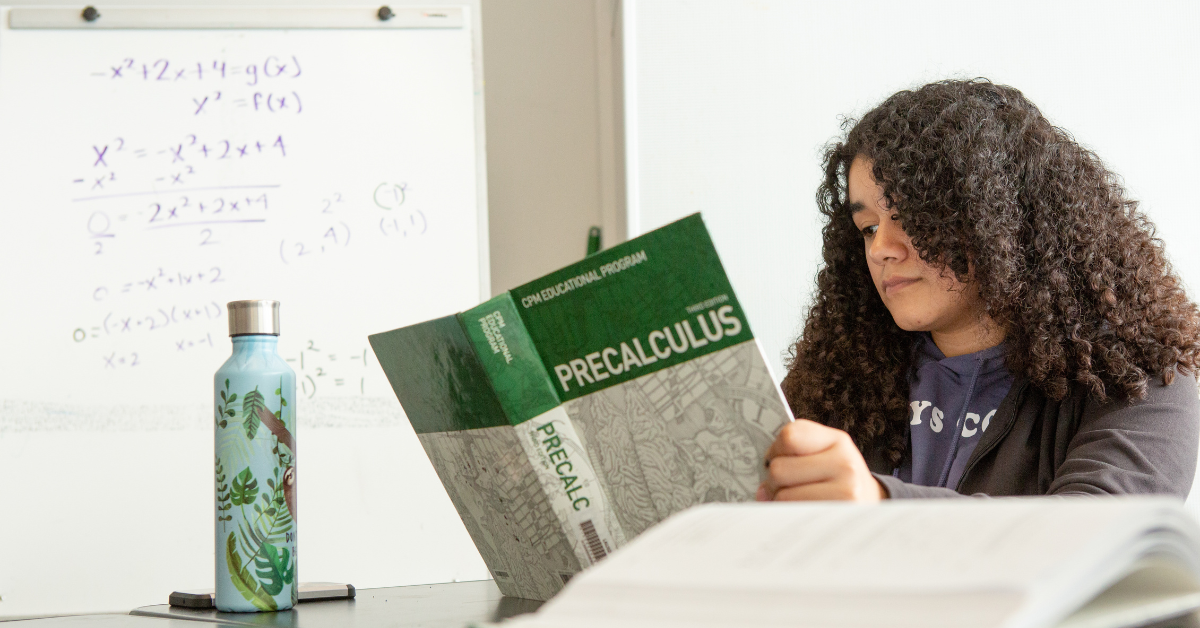Take Action
It’s happened to the best of us. Our kid asks for help with homework, we swoop in like a hero, happy to be called into action. Then we look down at the work, only to see the most fearsome of villains:
Math.
Oh damn. Here come all the recollections of torturous nights trying to understand the weirdly complex theories and problems of our grade-school years. Here comes the breach of our all-knowing-parent role with our kid. Here comes the moment when our kid learns we aren’t all-powerful.
What vexing hell is this?
For many adults, math anxiety is a natural and ongoing problem. Fortunately, there are some practical actions we can take to reduce and manage math-related worries.
The first step is to identify your triggers. Why are you anxious?
One of my triggers stems from failing to grasp foundational concepts that I missed when I switched schools more than once in my school career. That problem metastasized from grade to grade, leaving me needing substantial math remediation in later years. For years, I feared math would come up in some social or professional situation where the shame of not knowing enough would embarrass me.
Then, I got over it.
Once we’ve identified triggers, we can learn to manage and address them individually.
Conquering Math Anxieties
To do this, we might focus on the following:
- Commit to becoming as much of a mathematician as possible. Instead of hiding from the issue, make math a hobby and seek out all free tools available to build math competency. Many videos, podcasts and apps can provide additional support in tackling mathematical issues.
- Setting realistic goals. Rather than starting with the big hairy concepts that would befuddle Dr. Strange, begin with smaller goals and gradually build on them as your confidence increases. This will allow you to gain momentum over time.
- Take calculated risks. Once comfortable enough with basic equations, start branching out into unknown territory - give yourself permission to make mistakes and learn from them instead of being overwhelmed by fear of failure from the very beginning.
- Divide problems into manageable parts. Rather than attempting questions or equations as a whole, divide the problem into smaller chunks that can be tackled one at a time - this will reduce stress levels and increase accuracy when solving complex problems!
- Phone a friend. Sometimes simply talking through problems aloud (or writing them down) helps clarify concepts that may otherwise seem confusing - taking this extra step often reveals hidden details in complex scenarios, which increases overall comprehension. Having someone in your network - a friend or family member, or trusted colleague - who understands how to communicate with you can be a lifeline and time saver.
Just know math anxiety does not have to control adult lives forever - identifying individual triggers and finding ways to address them together is vital in overcoming it for good.
And, while it helps you to name and attack your math anxiety, it also sets you up to be the superhero you want to be with your kids.
Helping Your Child Overcome Math Anxiety
Parents aren’t taught how to help their children build foundational skills. There’s no book given to us at birth with a chapter on “how to raise a confident mathematician.”
Yet, we can learn to adapt to the challenge and be good guardians of our children’s math development.
The first thing that needs to be done is understanding why your child may be anxious about math. While some students may lack confidence in certain areas, others may have experienced past academic failures. Either way, understanding why they are struggling allows parents to take the appropriate steps to help their children get back on track with their studies.
Of course, there are a few steps that every parent can take regardless of the problem:
- Become the best co-pilot with your child’s teacher. Teachers and parents both get a bad rap when it comes to the academic failure of students. They should be allies. As a parent, having an ongoing communication thread with your child’s teacher where you can be specific about gaps in your understanding is a way to get the help you need.
- Take time out with your child. Establishing a constructive space for learning is essential if you want your child to naturally develop a positive attitude toward mathematics.
- Celebrate small successes. Rewarding small moments of success enhances motivation and encourages children to think of solutions differently. If young people only know failure without small wins, they will not be interested in the subject.
- Work on foundational skills. Gaining a deeper understanding of mathematics by working on foundational skills such as reading comprehension or fundamental numeracy will boost confidence over time and lead to long-term success.
- Practice problem-solving strategies. Teaching specific strategies like drawing diagrams or mapping out ideas helps children become more confident in predicting potential solutions before actually attempting them; this often leads them toward greater self-esteem and competence when confronted with unfamiliar problems and tasks.
- Find supportive resources. Parents should not forget about available external resources such as tutoring programs and online tools, which can provide additional support for their children’s mathematical development - all these tools should be used alongside dedicated one-on-one sessions at home to maximize results!
I don’t think there will ever be enough usable advice for parents who want to slay the math dragon and raise young people to be math champions. How math has been taught is different for our grandparents, us, and our kids, creating a broken support system chain.
But never fear. Math is a constant in the universe, and we can master it.
What matters most is first raising the expectations for improving our math abilities as individuals and then committing to work with teachers to help our children see themselves as math masters too.
Take Action:
Watch this video on dealing with math anxiety.
Use these resources from Bedtime Math.


